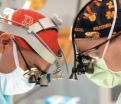(Press-News.org) Strict guidelines for treating paracetamol overdoses – introduced 18 months ago – are costing the NHS millions of pounds a year, researchers claim.
The number of patients receiving hospital treatment for paracetamol poisoning in the UK each year has risen by almost 50 per cent since the guidelines were updated by the Medicines and Health Regulatory Authority, a study estimates.
Researchers have assessed the impact of the MHRA decision to revise the guidelines, which was taken following the death of a young girl from a paracetamol overdose.
Patients with a life-threatening level of paracetamol in their blood are treated with the common antidote – acetylcysteine – given by intravenous drip. By lowering the treatment threshold to include patients with relatively low paracetamol levels, the MHRA predicted it would save one additional life around every two years.
According to the study, more than 31,000 extra patients would need to be treated to achieve this target at an approximate cost of £17.4 million to the NHS.
The researchers say that treatment could also be placing patients at unnecessary risk of unwanted side effects from the antidote, such as severe allergic reactions.
The team, led by the University of Edinburgh, estimated the impact of the revised guidelines by looking at the numbers of patients treated for paracetamol poisoning at large hospitals in Edinburgh, London and Newcastle upon Tyne.
By applying their findings to the rest of the UK, they estimated that the number of patients receiving hospital treatment for paracetamol poisoning increased from around 33,000 to 49,000 a year after the changes were introduced.
The study is published in the British Journal of Clinical Pharmacology.
Paracetamol is the most common cause of overdose in the UK but deaths are rare – between 150 and 250 people a year. Some people overdose mistakenly owing to confusion over which over the counter medicines contain paracetamol.
Professor Nick Bateman, of the University of Edinburgh's British Heart Foundation Centre for Cardiovascular Science, said: "Changes to the treatment guidelines for paracetamol overdoses are increasing the pressure on hard-pressed emergency departments and hospitals. A full review of present UK approaches to managing this common poisoning is required."
INFORMATION: END
Paracetamol poisoning treatment guidelines costing NHS millions
2014-03-26
ELSE PRESS RELEASES FROM THIS DATE:
Cereal flake size influences calorie intake
2014-03-26
People eat more breakfast cereal, by weight, when flake size is reduced, according to Penn State researchers, who showed that when flakes are reduced by crushing, people pour a smaller volume of cereal into their bowls, but still take a greater amount by weight and calories.
"People have a really hard time judging appropriate portions," said Barbara Rolls, professor of nutritional sciences and Helen A. Guthrie Chair in Nutrition. "On top of that you have these huge variations in volume that are due to the physical characteristics of foods, such as the size of individual ...
Kif15: The acrobatic motor protein that could pave the way for new cancer therapies
2014-03-26
Researchers at Warwick Medical School have shown for the first time how a protein motor, Kif15, uses acrobatic flexibility to navigate within the mitotic spindle. Understanding how it works could prove vital for the development of targeted cancer therapies.
The new study, published in eLife, describes the behaviour of Kif15 for the first time and provides a breakthrough step towards understanding the role it plays in cell division.
Many frontline cancer drugs target microtubules, the molecular cables that are used to build the mitotic spindle - the protein machine that ...
Parental addictions associated with adult children's arthritis
2014-03-26
The adult offspring of parents who were addicted to drugs or alcohol are more likely to have arthritis, according to a new study by University of Toronto researchers.
Investigators examined a group of 13,036 adults and found that 20.4 per cent of respondents had been diagnosed with arthritis by a medical professional. Investigators found that 14.5 per cent of all respondents reported having at least one parent whose drug or alcohol use caused problems while were under the age of 18 and still living at home.
Results indicate that individuals whose parents were addicted ...
Study finds secret to cutting sugary drink use by teens
2014-03-26
COLUMBUS, Ohio – A new study shows that teenagers can be persuaded to cut back on sugary soft drinks – especially with a little help from their friends.
A 30-day challenge encouraging teens to reduce sugar-sweetened drink use lowered their overall consumption substantially and increased by two-thirds the percentage of high-school students who shunned sugary drinks altogether.
The "Sodabriety" challenge, piloted by Ohio State University researchers, was an effort to confront the largest source of added sugar in the U.S. diet: sugar-sweetened soft drinks, sports and energy ...
Scientists track 3D nanoscale changes in rechargeable battery material during operation
2014-03-26
UPTON, NY-Scientists at the U.S. Department of Energy's Brookhaven National Laboratory have made the first 3D observations of how the structure of a lithium-ion battery anode evolves at the nanoscale in a real battery cell as it discharges and recharges. The details of this research, described in a paper published in Angewandte Chemie, could point to new ways to engineer battery materials to increase the capacity and lifetime of rechargeable batteries.
"This work offers a direct way to look inside the electrochemical reaction of batteries at the nanoscale to better understand ...
New clue to autism found inside brain cells
2014-03-26
The problems people with autism have with memory formation, higher-level thinking and social interactions may be partially attributable to the activity of receptors inside brain cells, researchers at Washington University School of Medicine in St. Louis have learned.
Scientists were already aware that the type of receptor in question was a potential contributor to these problems – when located on the surfaces of brain cells. Until now, though, the role of the same type of receptor located inside the cell had gone unrecognized. Such receptors inside cells significantly ...
Counting calories in the fossil record
2014-03-26
Starting about 250 million years ago, at the end of the Permian period, brachiopod groups disappeared in large numbers, along with 90 percent of the planet's species. Today, only a few groups, or genera, of brachiopods remain. "Most people won't be familiar with brachiopods. They're pretty rare in the modern ocean," said Jonathan Payne, a paleobiologist at Stanford University.
Meanwhile, bivalves flourished, diversifying into a staggering variety of shapes and sizes, and spread from marine to freshwater habitats. "After the end-Permian mass extinction, we find far fewer ...
Last drinks: Brain's mechanism knows when to stop
2014-03-26
The study found a 'stop mechanism' that determined brain signals telling the individual to stop drinking water when no longer thirsty, and the brain effects of drinking more water than required.
Researcher Professor Derek Denton from the Faculty of Medicine, Dentistry and Health Sciences at the University of Melbourne said the study provided insight into the human instincts that determine survival behaviour and are also of medical importance.
"Different areas of the brain involved in emotional decision-making were activated when people drank water after becoming ...
Two spine surgeons are 3 times safer than 1
2014-03-26
Seattle, WA—A new team approach has improved safety—reducing rates of major complications by two thirds—for complex spinal reconstructive surgery for spinal deformity in adult Group Health patients at Virginia Mason Hospital & Seattle Medical Center. An article in the March issue of Spine Deformity gives a detailed description of the standardized protocol before, during, and after the surgery, stressing the new approach's three main features:
Two spine surgeons in the operating room
A live preoperative screening conference
Monitoring bleeding during the operation
The ...
ATHENA desktop human 'body' could reduce need for animal drug tests
2014-03-26
Creating surrogate human organs, coupled with insights from highly sensitive mass spectrometry technologies, a new project is on the brink of revolutionizing the way we screen new drugs and toxic agents.
ATHENA, the Advanced Tissue-engineered Human Ectypal Network Analyzer project team, is developing four human organ constructs – liver, heart, lung and kidney – that are based on a significantly miniaturized platform. Each organ component will be about the size of a smartphone screen, and the whole ATHENA "body" of interconnected organs would fit neatly on a desk.
"By ...






